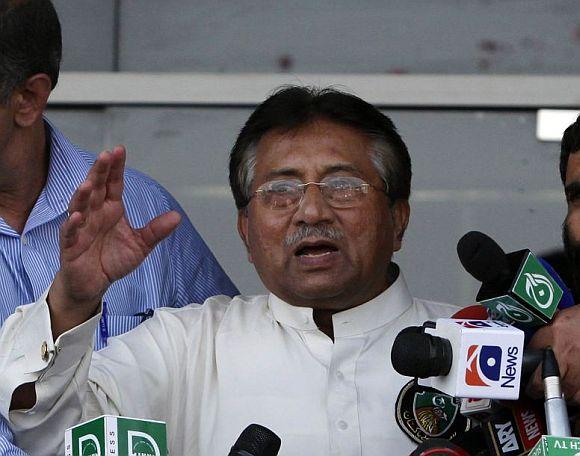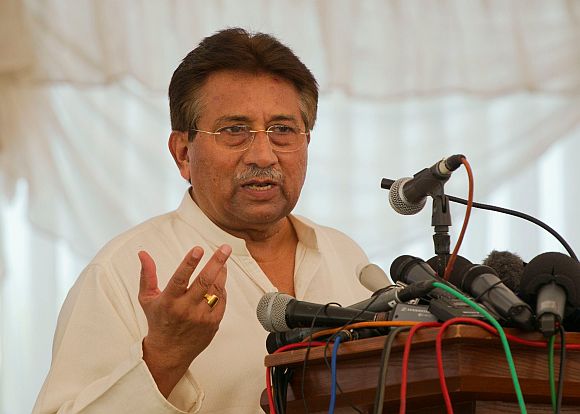 | « Back to article | Print this article |
High drama follows Pak court order to arrest Musharraf
Former Pakistani military ruler Pervez Musharraf was on Thursday ordered to be arrested immediately by a court here over the sacking of 60 judges during emergency rule in 2007, but amid high drama he fled from the premises despite thick security blanket.
Musharraf, 69, who appeared in the Islamabad high court on Thursday morning to seek extension of his interim bail, was whisked away by his bodyguards, all commandos, before the police could take him into custody following the court order.
Rejecting his plea seeking extension of bail, Justice Shaukat Aziz Siddiqui ordered police to arrest him immediately.
Even as police tried to reach the former President, his bodyguards rushed him out of the courtroom to his black SUV. Musharraf's motorcade then drove out of the court complex before police could act.
A large contingent of police and paramilitary personnel deployed at the complex to provide security to Musharraf also did not act as the former dictator's security team of army commandos escorted him out of the courtroom.
Musharraf's convoy drove from the court to his farmhouse at Chak Shahzad on the outskirts of Islamabad, television channels reported.
As the former military ruler's arrest appeared imminent, Mohammad Amjad, a senior leader of his All Pakistan Muslim League party, said a team of legal experts was examining the court's order.
Amjad said Musharraf will act according to the law and if the legal experts deemed it necessary, he would surrender to the authorities.
Click on NEXT to read further...
High drama follows Pak court order to arrest Musharraf
Soon after Musharraf returned to his farmhouse, a contingent of Pakistan Rangers personnel deployed to protect him left the residence. Some analysts contended this was a sign that the security establishment would not back Musharraf.
Sources told PTI that the government was considering a proposal to declare Musharraf's farmhouse a "sub-jail" so that he could be detained at his residence. Authorities believe it would be better to hold Musharraf at his farmhouse in view of serious threats to his life, the sources said.
Musharraf could also approach the Supreme Court to seek pre-arrest bail, sources said.
Last week, Musharraf was granted interim bail for six days after he surrendered to the Islamabad High Court in connection with the case over the detention of judges in 2007. The same court had earlier declared him a "proclaimed offender" or fugitive in the case.
During Thursday's hearing, Deputy Attorney General Tariq Mehmood Jahangir told the court that Musharraf had been granted interim bail on the condition that he would cooperate with police officials investigating the case.
Justice Siddiqui remarked that Musharraf had been accused of destroying the judicial system and he was bound to cooperate in the investigation. The judge was then told by the investigating officer that Musharraf had not come to the police station or cooperated with the probe.
The investigating officer further said Musharraf had sent a message that he would say whatever he had to say in court.
The case against Musharraf is based on an FIR filed in August 2009 by a lawyer named Chaudhry Mohammad Aslam Ghumman.
Ghumman had asked police to initiate proceedings against Musharraf for detaining over 60 judges, including Supreme Court Chief Justice Iftikhar Chaudhry, after imposing emergency on November 3, 2007.
Since Musharraf returned to Pakistan last month after nearly four years in self-exile, he has been in and out of court several times to get his bail extended over the 2007 killing of former premier Benazir Bhutto, the death of a Baloch leader Akbar Bugti in a 2006 military operation and for imposing emergency rule in 2007.
The Taliban have also threatened to target him.
Earlier this week, Musharraf was disqualified from contesting next month's general election, effectively ending his ambitions for a political comeback.

